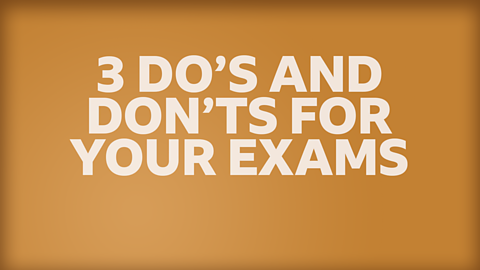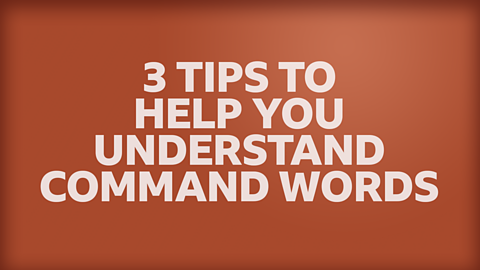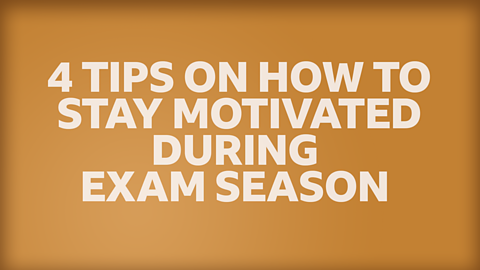You can go into an exam with full knowledge and understanding of a subject, but if you don't understand the exam paper, then you could be missing some vital marks that could be the difference between one grade and the next.
Luckily for you, our exam veterans have some really helpful hints and tips on how to understand your exam paper. Once you've watched the video, scroll down for a recap of the information to help you understand your exam paper.
Amy: Okay. I've got some expert tips on how to understand your exam papers.
Daachi: Can't wait.
Dylan: At the start of an exam, it's really easy to panic and not take in the exam paper properly. But that exam paper is your friend. It has all the information you need if you just take the time to understand it.
Amiga: First tip. Before the exam starts spend a few moments reading the instructions on the front.
Amy: Reading the front page is so important. It gives you clear instructions about what you are required to answer. I did an exam once and on the front page it said I had to answer one compulsory question before choosing one from the rest. Some people didn't read the instructions properly and ignored the compulsory question, so they missed out on a lot of marks.
Dylan: In my English exam a few students I noticed, didn't read the instructions properly and so answered the wrong questions. They got a zero for those questions.
Amiga: Wow.
Dylan: I know. Scary.
Amiga: Very, very scary. That is a prime example to read the instructions on the front. Don't be one of those people. Take your time and read the questions. I'm definitely one of those people who takes my time.
Amy: Okay. Next tip.
Daachi: Go through the paper from start to finish. Just so you have an idea of what's ahead, including the back page. Have a look at the amount of marks given for each question so you can plan your time.
Amiga: That's a really long tip, but I'll give you my six word summary. Read the back, flip the paper. So for one maths paper I didn't see the question at the back and since then I've always checked the back.
Dylan: I totally agree. Always read the back page. It will probably say end of questions. It's worth checking. Also some exam papers are really wordy. So it's worth taking the time to make sure you really understand something.
Amy: I like going through the paper and highlighting the key information and the command words. For each section I'll just take a moment to read things through. I'll highlight or underline the important words. What's this question asking me to do? How many marks is it?
Daachi: How much time have I got for this? And when does it make sense to move on to the next question? Looking at the exam as a whole, divide how many minutes you have by the amount of marks. So a 60 minute exam with 60 marks is one minute per mark. But don't forget to leave yourself some reading time at the start.
Amiga: Okay. Last tip.
Dylan: Look at past papers, that way you'll be familiar with the structure.
Amiga: Past papers are the best. Have I mentioned I love past papers.
Dylan: Once or twice.
Amiga: It's really helpful to look at past papers so you know what sort of questions you'll be answering and when. You can also time yourself doing past papers with no help. So you see how long it takes you to answer everything.
Amy: With my dyslexia, at first I found it really hard with practice papers to understand the questions. I was like, How do I do this? So I went to teachers a lot and I was like, can you break down what I need to do here? How do I get this? Once I got to the real exam, I knew the strategies. I didn't feel like I was at such a disadvantage because I knew what I was doing.
Dylan: Your teachers might be running demystify sessions to help you go over all the common mistakes that crop up. If they offer them, make sure you go. If they don't, then ask them to.
Amiga: So make sure you read the instructions on the front. Go through the paper from start to finish, including the back page. So you know what's ahead.
Amy: And honestly, if you can remember one thing.
Amy & Daachi: Check the back page.

Three tips to help with your exam paper
At the start of an exam, it's really easy to panic and not take in the exam paper properly, but it doesn't have to be that way. Take a breath and read our tips below – hopefully you'll have a much better idea of how to understand your exam paper.
Read the instructions Before your exam starts, take a few minutes to read the instructions on the front of the paper. This will help you to understand which questions you are required to answer – some questions may be compulsory, whilst others are optional. Reading the instructions will make sure you are on track and don't waste time answering the wrong set of questions.
Beginning, middle and end Going through the paper from start to finish at the start of your exam will give you an idea of what to expect so that there aren't any surprises. Make sure you look at the back page too, it will probably say 'end of questions', but it's best to check. Spend a few minutes checking over the paper before you begin answering the questions. As you go through, you could also highlight some of the key words and pieces of information that you've noticed that you may miss later on.
Past papers are your friends Past papers are really useful to help you get to grips with the structure of your exam. They will help you see what type and style of questions you may be coming up against in your real exam. Doing past papers will help you get all the mistakes out of your system, and to learn from them. Make sure you ask your teachers for their advice and tips on where you went right and wrong in your past papers. Then when it comes to the real exam you should be as prepared as you can be for anything that comes your way!

If you need support
You should always tell someone about the things you’re worried about. You can tell a friend, parent, guardian, teacher, or another trusted adult. If you're struggling with your mental health, going to your GP can be a good place to start to find help. Your GP can let you know what support is available to you, suggest different types of treatment and offer regular check-ups to see how you’re doing.
If you’re in need of in-the-moment support you can contact , where you can speak to a counsellor. Their lines are open 24 hours a day, 7 days a week.
There are more links to helpful organisations on Â鶹ԼĹÄ Action Line.

If you want some more useful exam tips and guidance, then we've got loads of amazing advice to help guide you through exam season on the pages below, what are you waiting for? Give them a tap!

3 do’s and don’ts for your exams
We've asked our exam veterans for their top do's and don'ts to help you get through your exams.

3 tips to understand command words
Our exam veterans outline the importance of using command words, and show how you can use them to boss your exams.

4 tips on how to stay motivated during exam season
Exam season can feel like a long road. We know it can sometimes feel difficult to keep your energy and motivation up, but don't worry – we've got you.
